Facebook company is the largest social media network globally. According to Tankovska (2021), there are about 2.7 billion monthly active Facebook users in the second quarter of the year 2020, which is a sign of a tremendously rising figure. It is also worth noting that the Facebook company has the following social media platforms: Messenger, Whatsapp, Facebook, and Instagram. Facebook measures active users as those that have logged in to their media in the last 30 days.
- Online marketing gives companies the ability to reach many clients within a short time globally.
- According to Shaw (2018), Social media entails a vast network of interactions within friends, families, and businesses globally.
- Social media is an incredible marketing platform that can help an organization penetrate significantly into society.
Social media has surpassed the print and radio media in the passage of information. According to Forbes, by January 2018, there were about 4.02 billion internet users globally. Then the active social media users were about a 3.2billion figure that translated to 42% of the world’s population. Individuals who pay attention to advertisements run on Facebook have higher chances of buying the same products than those that do not bother.
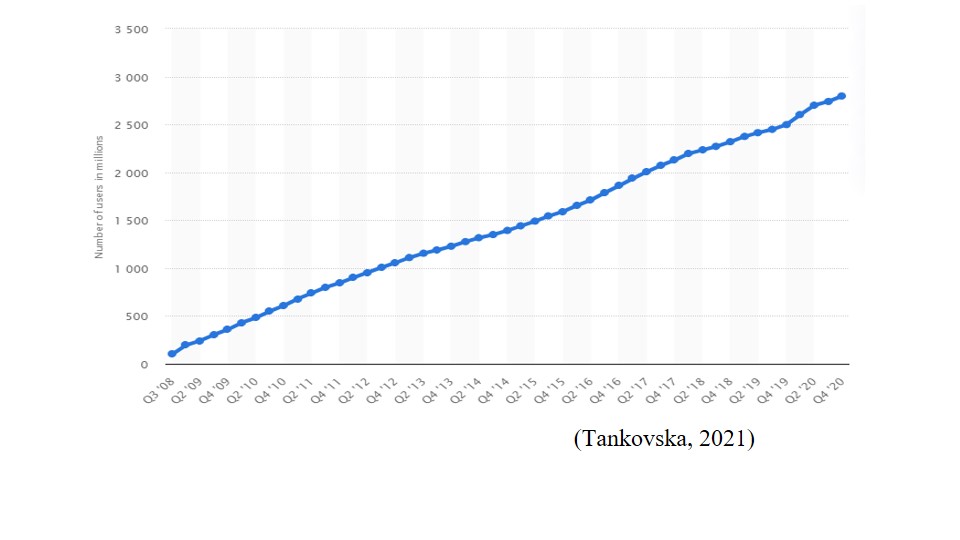
Narrative and Exemplification Theory
- Exemplification theory posits that events are an exemplification of the property of the entities (Bigsby, 2019).
- Narrative theory postulates that people are generally storytellers (OSU, n.d.).
Representativeness heuristic refers to a unique type of availability whereby abstract base rates are insignificant when a client makes quantitative decisions on the event population. However, the judgment relies on more concrete exemplars accessible during a clients’ decision-making. The decision-making about a product depends mainly on the effectiveness of models when matching the information entailed in the online marketing information (APA Dictionary of Psychology, n.d.).
The availability heuristic postulates that decision-making is significantly influenced by how easy information comes to an individual mind. This heuristic is applicable when evaluating the possibility or frequency of an event taking place (Behavioral Economics, n.d.). Based on this heuristic, purchasing frequency directly relies on the quickness in which the marketing information comes to the clients’ minds.
Exemplars can be in the form of images accompanied by text serving as information during the marketing.
Exemplification Theory. Human decision-making on product information on Facebook depends on the following cognitive components: Representative and availability heuristic (Brosius, 2017).
Narrative theory. Facebook marketing can take advantage of the fact that online people will narrate to others about the products being marketed on Facebook. The decision-making of the online target audience will influence others based on the online marketing content.
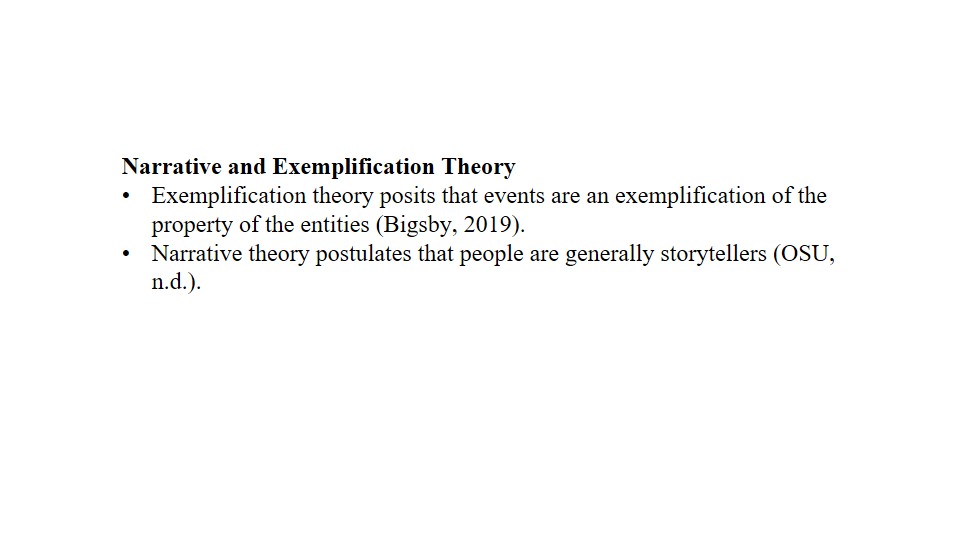
Hypothesis and Research Question
RQ: Is online marketing using Facebook effective?
H: Facebook is an effective tool in the marketing of products.
Participants
N=100
Data from the Questionnaires
- Gender: Males= 51%, Female= 49%.
- Age: 18-70.
- Respondent’s Race: White/Caucasian=15%, Black/African American= 24% , American Indian= 18% , Latino/Hispanic= 15%, Asian= 12%, Pacific Islander/Hawaiian= 16%.
- Respondents paying attention to Facebook adverts= 61%.
- Respondents that placed their order following persuasive Facebook advertisement=31%.
For this research, Facebook marketing entails the scenario where a company uses Facebook or Facebook Lite applications, excluding Instagram, Whatsapp, and Messenger, in creating awareness to the potential clients.
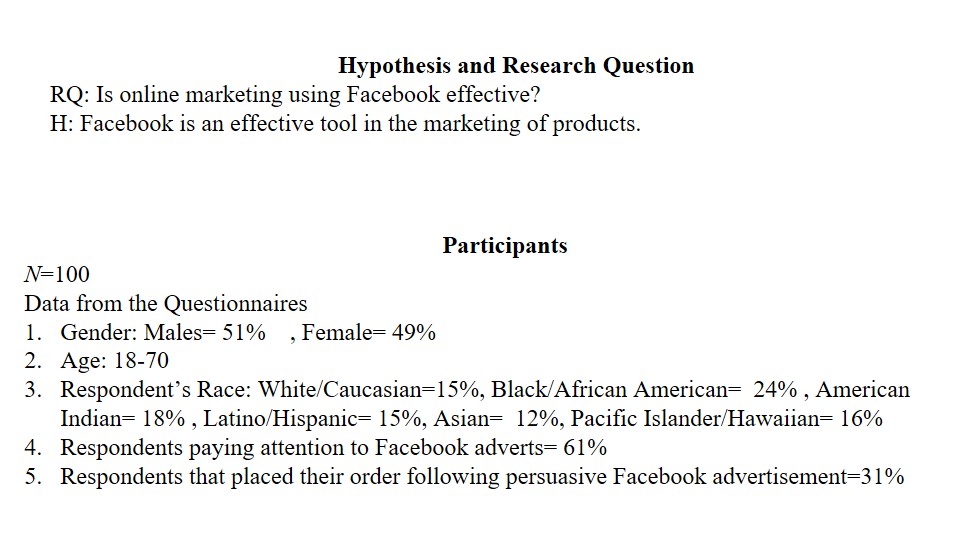
Gender of Respondents
Respondents that Paid Attention To Facebook Advertisements
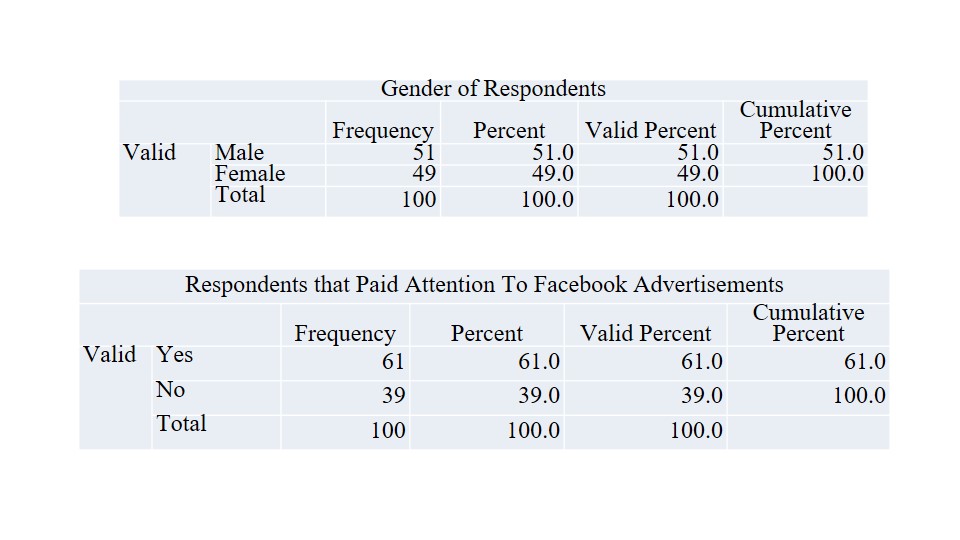
Race of Respondents
Respondents that had previously Bought From Facebook Advertisement
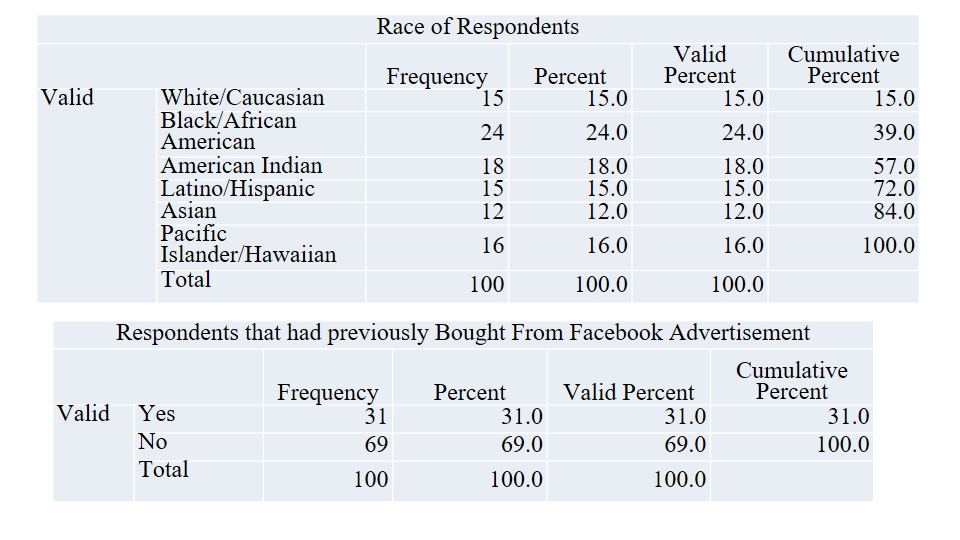
RQ: Is online marketing using Facebook effective?
Analysis of Variance of Buying from Facebook Advertisements
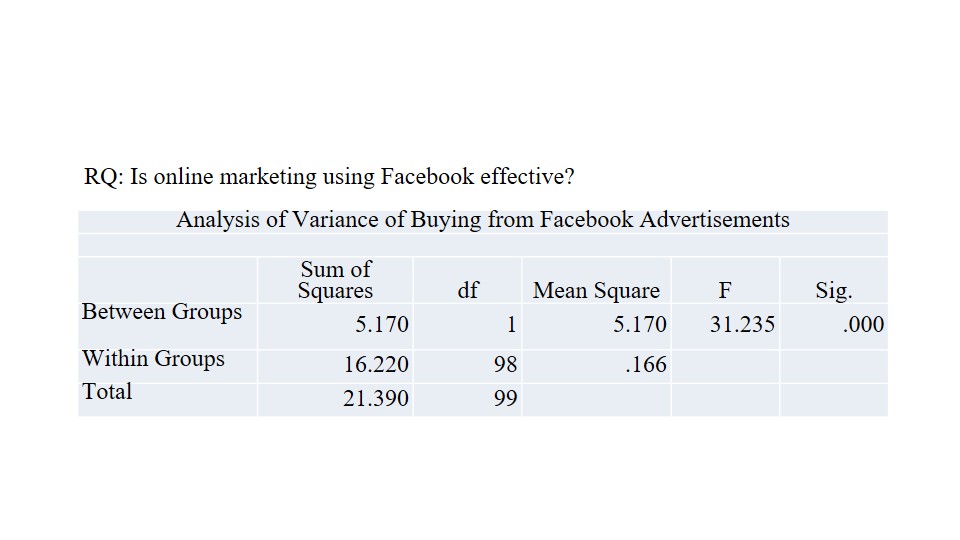
Descriptive Statistics
Respondents that paid attention to Facebook advertisements (M=1.39, SD=0.49)
Respondents that bought products from Facebook advertisements (M=1.69, SD=0.46)
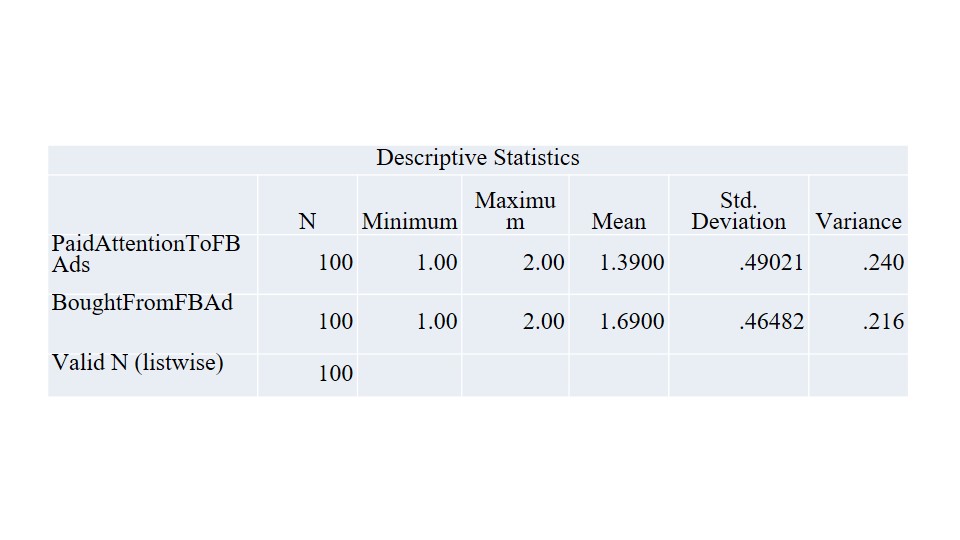
Discussion
- Respondents that paid more attention to advertisements being run on
- Facebook had high chances of buying the products.
- Some Facebook users are opposed to buying goods online, fearing being inconvenienced.
- Male and female Facebook users are 1.51 and 1.19 billion globally.
Limitations of Study
- The study only focused on Facebook Lite and web users.
- There were not many respondents considered during the study
Future Directions
- There is a need for further studies on what makes some clients not bothered with online advertisements and still place their orders online.
- There is a need to compare the impact of gender, race, and age on purchasing goods marketed on Facebook.
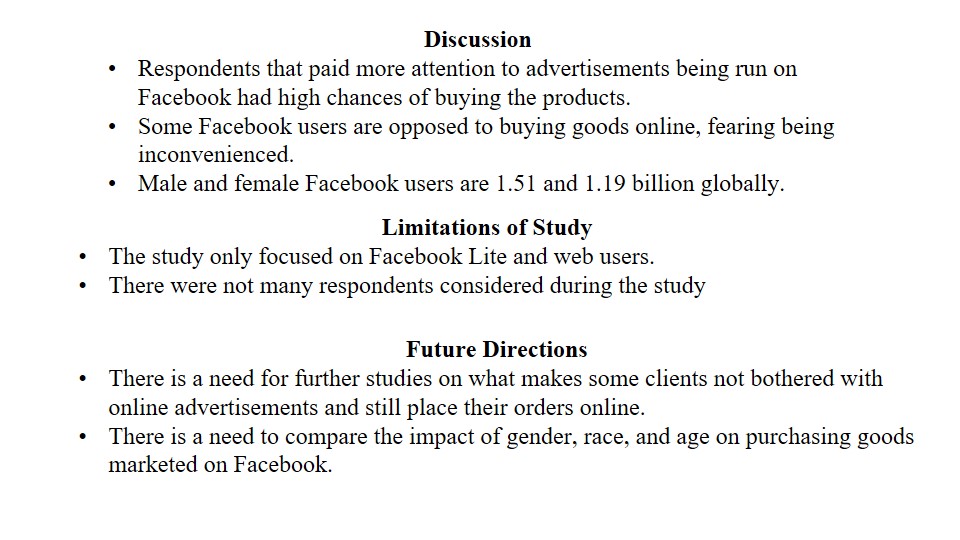
References
APA Dictionary of Psychology (n.d). Representativeness heuristic. Web.
Appel, G., Grewal, L., Hadi, R., & Stephen, A. T. (2020). The future of social media in marketing. Journal of the Academy of Marketing Science, 48(1), 79-95. Web.
Behavioral Economics. (n.d.). Availability heuristic. Web.
Bigsby, E., Bigman, C. A., & Martinez Gonzalez, A. (2019). Exemplification theory: a review and meta-analysis of exemplar messages. Annals of the International CommunicationAssociation, 43(4), 273-296. Web.
Bramble, J. (2018). 13 Facebook engagement tactics for your business page. Web.
Brosius, H. B., & Peter, C. (2017). Exemplification theory. The international encyclopedia of mediaeffects, 1-9.
Brown, D. (2020). Advantages and disadvantages of online shopping. Spoolah. Web.
Cakebread, C. (2017). To keep its revenue growing, Facebook needs to look outside the US. Insider. Web.
Jones, W. (n.d.). What are the disadvantages if online shopping? Stock Monkeys. Web.
Jilcott, S. B., Ng, S. W., Blitstein, J. L., Gustafson, A., Kelley, C. J., Pandya, S., & Weismiller, H. (2020). Perceived advantages and disadvantages of online grocery shopping among special supplemental nutrition program for women, infants, and children (WIC) participants in Eastern North Carolina. Current developments in nutrition, 4(5), 1-7. Web.
HRCCU. (2021). Pros & cons of online shopping. Web.
Hutchinson, A. (2019). Facebook reaches 2.38 billion users, beats revenue estimates in latest update. Social Media Today. Web.
MDG. (2018). It’s all about the images [infographics]. Web.
OSU. (n.d.). What is narrative theory? Web.
Shaw, A. (2018). How social media can move your business forward. Forbes. Web.
Tankavoska, H. (2021). Number of monthly Facebook users worldwide as of 4thquarter 2020. Statista. Web.